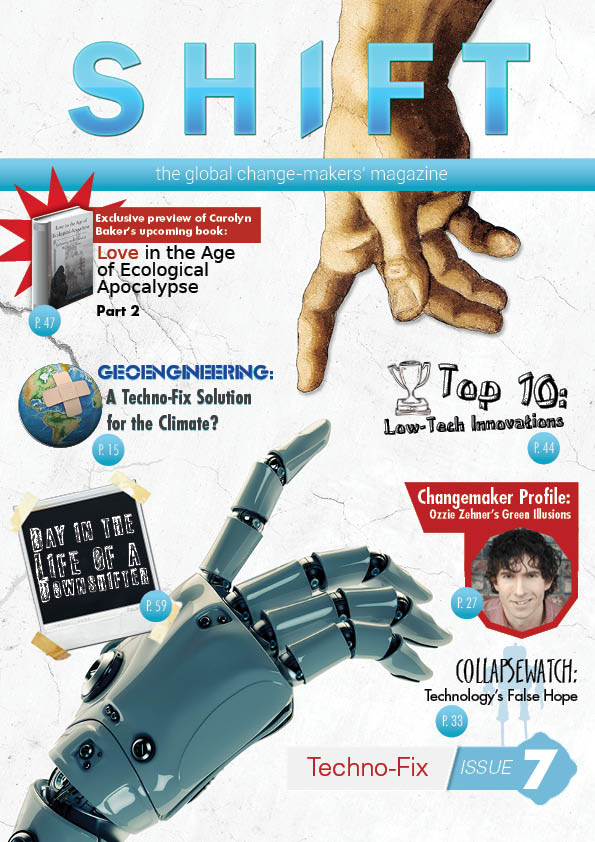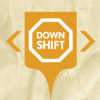
Love in the Age of Ecological Apocalypse – SHIFT preview, Part 2
Chapter 3: Friends, Neighbors, and the Community
Men and Women
For better or worse, the last four decades have been profoundly shaped by feminist consciousness. I am a feminist, and I have no problem with saying so. While I am not satisfied with the gains women have made in terms of equality since the 1970s, I am aware that the lives of most women have been greatly improved by the magnitude of them. I am also pleased with changing attitudes toward Lesbian, Gay, Bisexual, and Transgender (LGBT) people, particularly in the new millennium. Yet these strides in human equality could vanish overnight in the likely event of a national or natural disaster or a terrorist event, and they will most certainly be drastically altered as industrial civilization disintegrates.
James Howard Kunstler has written and spoken profusely his opinion regarding the role of women post-collapse. From his perspective, as the larger systems fail and as law enforcement protection rapidly deteriorates as a result of economic meltdown, myriad eruptions of violence will occur and will escalate in many communities. While Kunstler believes it will be directed toward both men and women, his fictional novels of post-industrial living imply that women will bear the brunt of it. Readers familiar with his novels World Made By Hand and The Witch of Hebron, are aware of his portrayal of women in those works which essentially depict three female roles: subservient spouse or partner; physically repugnant, overbearing cult leader; and earth-mother hooker. Kunstler argues that in a chaotic, collapsing world, the status of women may devolve to a pre-feminist movement level as if that twentieth-century social phenomenon never occurred. Kunstler’s 2013 article “Class, Race, Hierarchy, And Social Relations In ‘The Long Emergency’,” further clarifies his perspective on these issues.
While I disagree with Kunstler regarding the extent to which feminist influences in the culture will be rolled back in collapse, I do believe that violence against both genders will proliferate. In the first place, one has only to observe the gun hysteria that has engulfed this culture to find this assertion plausible. Furthermore, in times of social chaos and myriad layers of collapse, violence usually becomes epidemic and most certainly will in any culture as unprepared for collapse as this one unequivocally is. Scapegoating, racism, sexism, and homophobia are likely to rage as society disintegrates.
In two of Hollywood’s recent post-apocalyptic portrayals, “The Road” and “The Book of Eli,” the treatment of women becomes profoundly barbaric. In these depictions of life post-collapse, a woman cannot survive unless she does whatever is necessary to be protected by boorish, brutal men.
Few collapse-aware women are actually talking about this. In my book Navigating The Coming Chaos, I have included an entire section on violence against women in collapse, but the conversation about this issue needs to be expanded, as well as deepened in terms of exploring the ramifications not only of the inevitability of escalating violence against women, but the emotions this reality evokes and what pro-active measures we will take as individuals and communities. Moreover, the unspoken elephant in the room in many communities and gatherings of collapse-aware individuals is a repository of wounding carried by both genders in relation to the other.
The overt assumption is that men and women will join forces to sustain and protect one another, but not far beneath the surface are myriad lingering resentments, injuries, and other shadow material that will invariably erupt in a chaotic milieu—and that in current time already subtly contaminate cross-gender relationships and discourse.
If indeed parts or all of our geographic regions become more volatile and warlike, how will both genders navigate this, and to what extent will the wounds we carry which we attribute to the other gender influence our relationships with it? Escalating violence changes people, as any war veteran can attest. Is the only alternative that women become more aggressively feminist and men become more patriarchal? How will we prevent demonizing the other gender when we both desperately need to ally with each other? How will each gender take responsibility for the shadow masculine and shadow feminine, characterized by the destructive aspects of each that we all seek to “evolve beyond”?
Moreover, what happens with LGTB members of a community in a time of scapegoating and perceived threats to “masculinity” or “femininity”? What is the role of these individuals in venues where “gender wars” have erupted? Do heterosexual women exclude some lesbians because they are “too masculine” or do some heterosexual men tell gay men to “man up or get out”?
One model to which I consistently return is that found in the West African Dagara Tribe of Burkina Faso in which LGBT people are perceived as “gatekeepers” between the tangible, human world and the eternal. For this reason, in the Dagara Tribe, LGBT men and women hold special roles in ceremony and in negotiations between groups of heterosexuals who are experiencing conflict with the other gender. Because the Dagara community recognizes the value of the energies of both masculine and feminine that LGBT individuals possess, they are enlisted as liaisons between heterosexual women and men in conflict. Similarly, in the traditions of many First Nation tribes on this continent, a “two-spirits” person was valued as the bearer of “special medicine” which included esteemed roles in ceremony and in negotiations between genders.
For countless reasons, people preparing for collapse, whether planning to live in an intentional community or not, must acquire substantial listening and communication skills. It is not inconceivable that somewhere, somehow, in a volatile situation, these skills could determine the difference between life and death as much as the ability to grow food could prevent a family from starving.

















